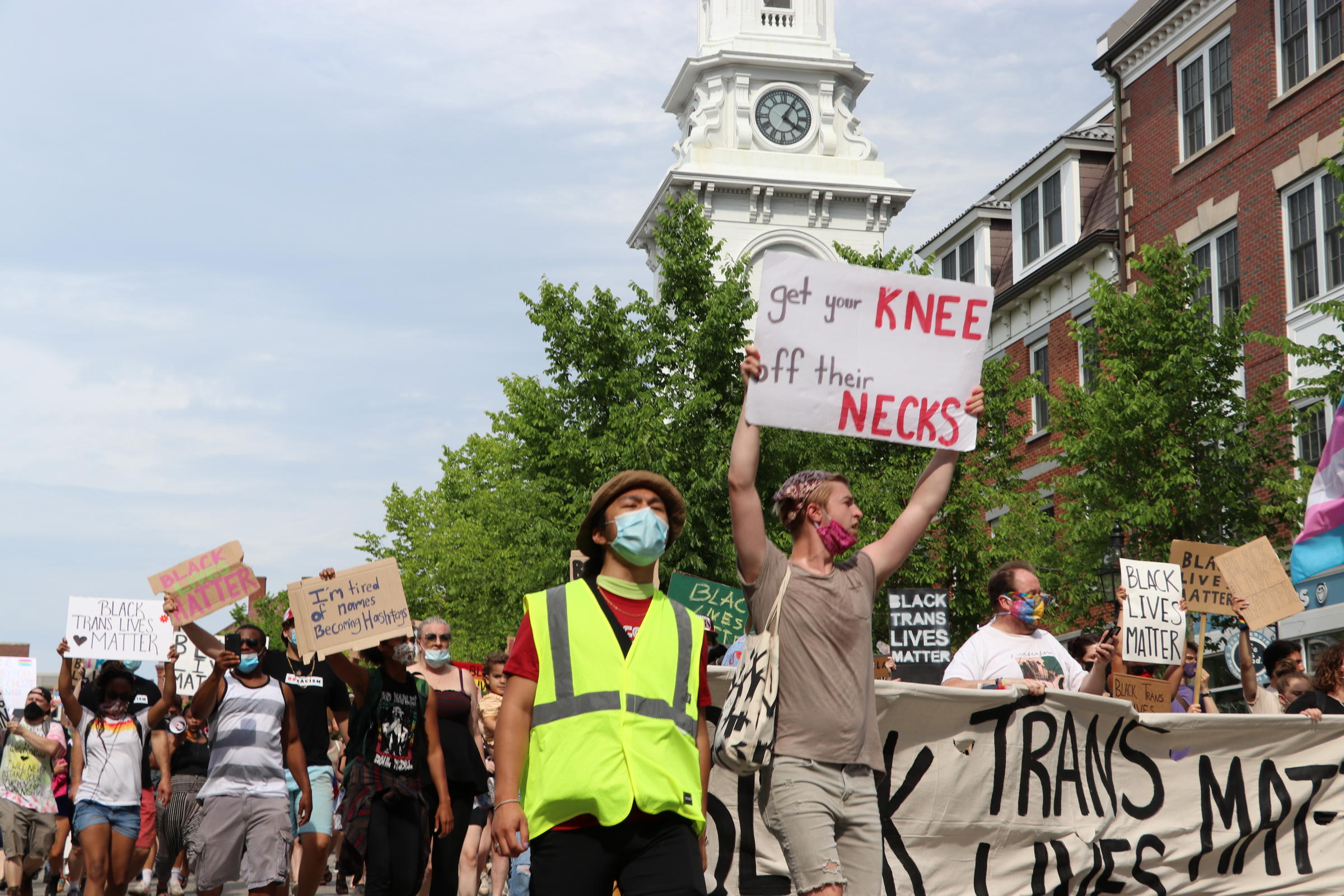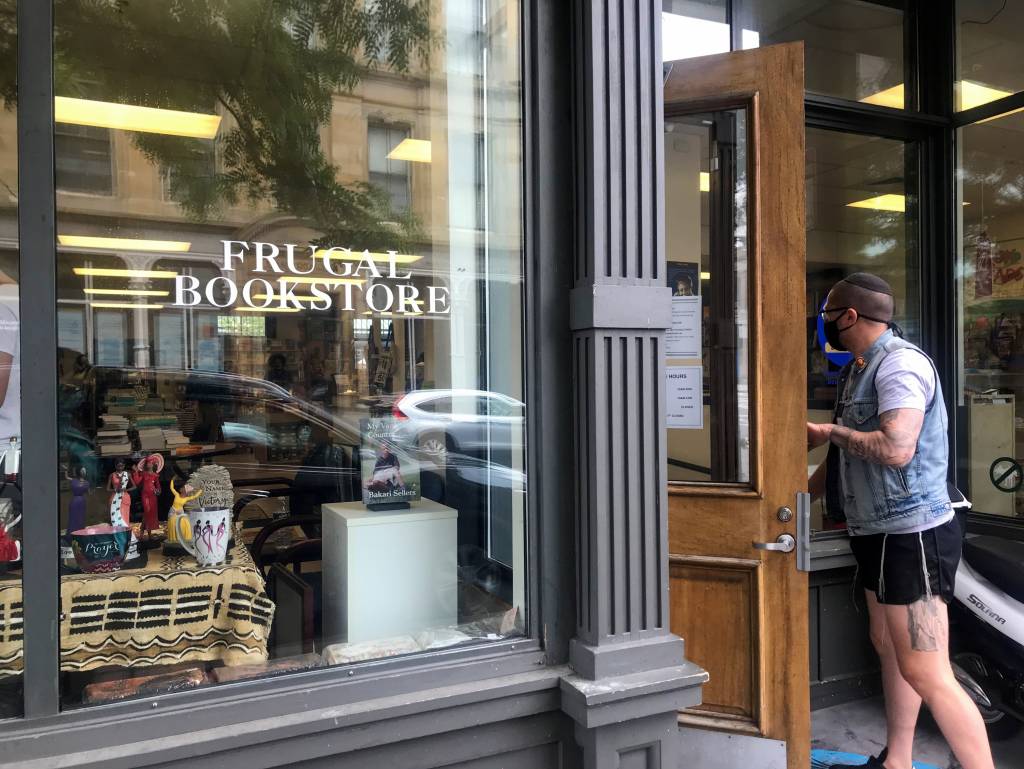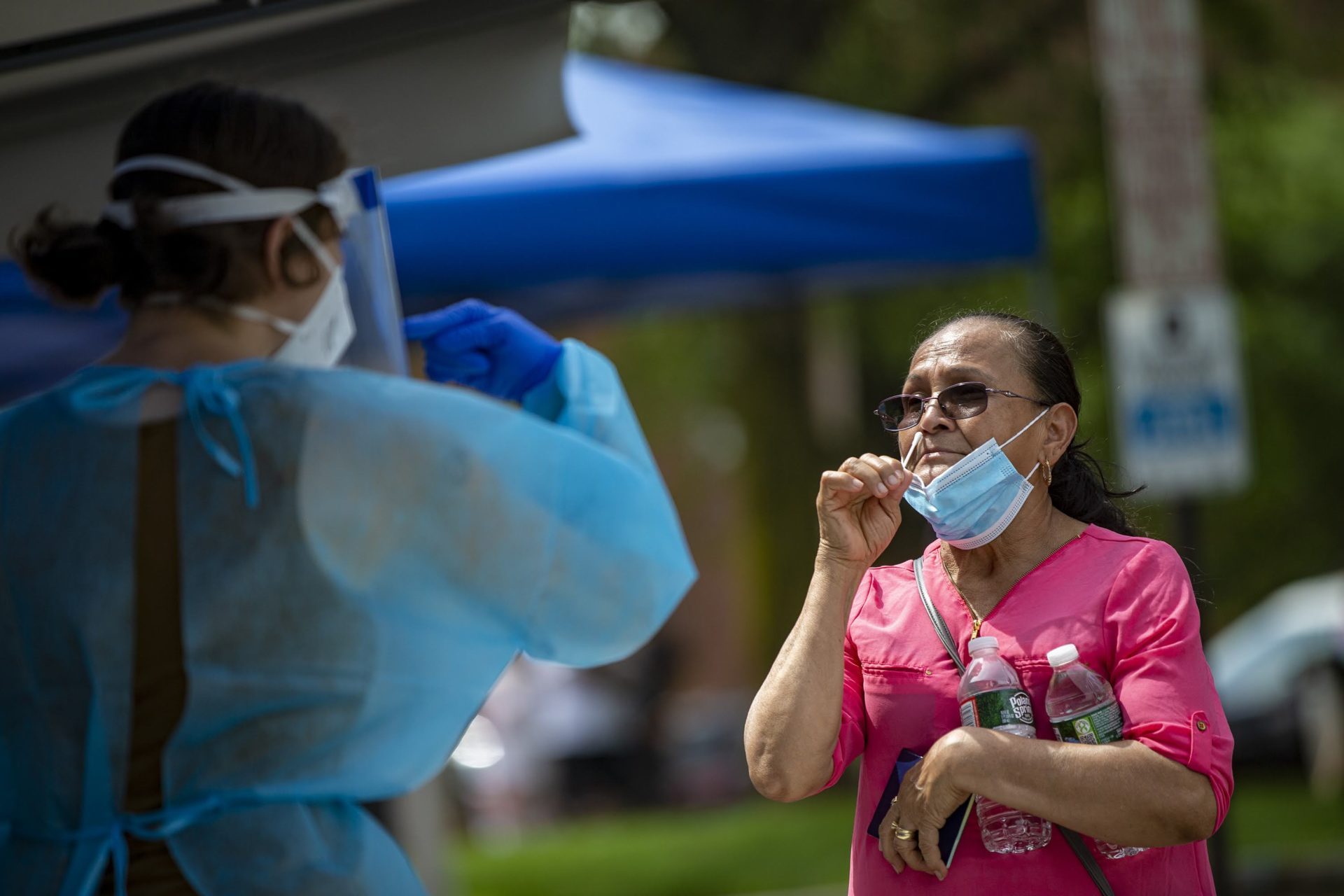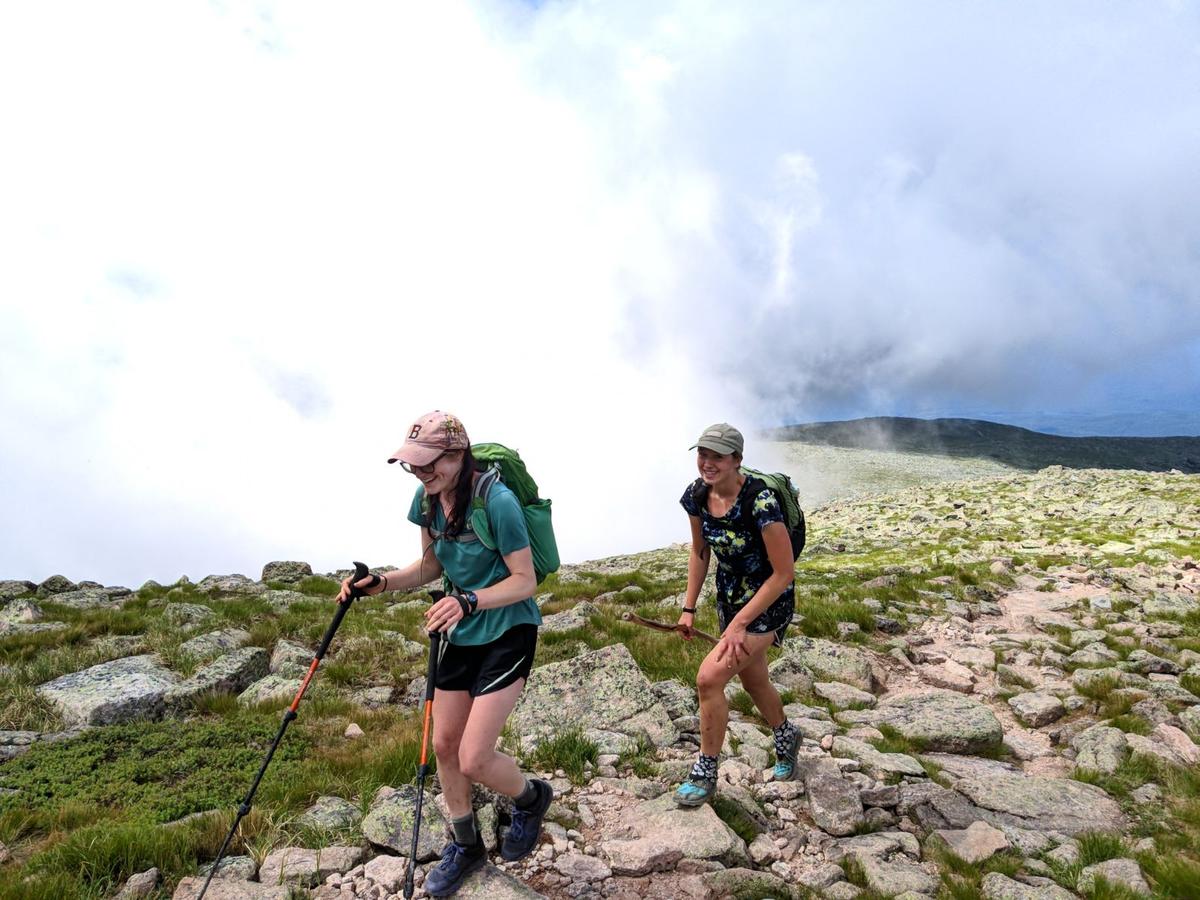Episode 207: We Changed For COVID. What About The Climate Crisis?; How Companies Say They’ll Fight Racism
The pandemic forced many of us into new habits. Why can’t we do that with climate change? This week on NEXT, why seismic lifestyle shifts to help the environment could be possible right now. Plus, how the business community is addressing systemic racism. And the tension over thru-hikers who resisted calls to quit the Appalachian Trail during the pandemic.
COVID-19 And ‘Black Lives Matter’ Have Sparked Action. Will Climate Change?

Masked demonstrators take part in the Black Trans Lives Matter march in Portsmouth, N.H., on June 28, 2020. (Dan Tuohy/NHPR)
In the past few months, people have made seismic lifestyle and attitude shifts, both in response to COVID-19 and the Black Lives Matter movement. So why haven’t more people reacted with the same urgency to climate change?
“Unfortunately, that’s part of the human condition,” said Cheri Schmitt, a teacher in Bedford, New Hampshire. “People don’t tend to want to focus on something until it’s in a crisis state.”
But as New Hampshire Public Radio‘s Annie Ropeik reports, that could change in this current moment in history. In response to the pandemic, many of us have demonstrated we can alter our behavior quickly and dramatically. Plus, experts say massive collective action on climate change won’t shut down the economy like the pandemic has — it may actually create new industries and jobs and improve health outcomes.
This story comes from New Hampshire Public Radio’s new climate change reporting initiative “By Degrees.”
In Boston, Black-Owned Bookstore Copes With Nationwide Book Backlog

Frugal Bookstore sits in Nubian Square in the Boston neighborhood of Roxbury. (Saraya Wintersmith/WGBH)
Lately, some Black-owned businesses have seen an uptick in white clientele looking to support their shops. For Black bookstore owners, this new crop of customers is seeking books on race to help navigate America’s moment of racial reckoning. WGBH Radio’s Saraya Wintersmith reports on how this has fueled a bittersweet business bump for Frugal Bookstore, a small business in Boston’s Roxbury neighborhood.
“It’s been hectic,” said Leonard Egerton, Frugal Bookstore’s co-owner. “And it’s overbearing for us at times, but we have to keep pushing on.”
How Two Hard-Hit New England Cities Slowed Coronavirus Infections

A resident of Chelsea, Mass., is being directed by a healthcare worker before inserting a swab up her nose during free COVID-19 testing offered by the state in Chelsea Square. (Jesse Costa/WBUR)
New England has largely avoided the recent surge in coronavirus cases we’re seeing in other parts of the country. But two cities in particular had to work really hard to get there. Both Chelsea, Massachusetts, and Central Falls, Rhode Island, had the highest rate of positive coronavirus tests in their respective states earlier in the pandemic.
“We started to learn that people were afraid, that people didn’t want to leave their homes,” said Dr. Dean Xerras, medical director at the MGH Chelsea clinic. “People didn’t want to register and report that they were sick or have to give their names.”
So these two cities rolled out programs to support residents and help them feel safe. As WBUR‘s Martha Bebinger reports, these cities are now reporting few — if any — daily cases, and their dramatic improvement may provide lessons for emerging hot spots.
They Were Asked To Stay Home, But Some Thru-Hikers Insist On Finishing The Appalachian Trail

Kristen Glennie and Mary Szatkowski finished their hike July 4, 2020. (Courtesy of Kristen Glennie and Mary Szatkowski)
Every year, several thousand adventurous souls set out to hike 2,190 miles on the Appalachian Trail from Maine to Georgia, or the other way around. But because of the pandemic, the conservancy group that manages and protects the trail advised thru-hikers to put their dreams on hold. Some have refused.
“I know for me personally, I put so many other things on life on hold to come and do the trail, and this was my one chance to do it, so I was not gonna stop,” says thru-hiker Dustin Kornegay. “That’s what it came down to.”
As Maine Public Radio’s Susan Sharon reports, this has created tension between those who want to push personal boundaries — and those who say there should be limits to protect the public.
NEXT Wants to Hear From You:
Last week, we heard from a listener in a rural part of Maine that has seen few reported cases of COVID-19. She told us she generally does not wear a mask, and described feeling awkward when one of her friends insisted on wearing one during a visit. So we asked you how you felt about mask wearing. And it struck a nerve. We got the most responses ever to one of our listener questions. One person we heard from was Bela Chowdhury of Glastonbury, Connecticut.
“If this is a very small gesture … why shouldn’t we do it and help eliminate this disease? And it has been proven that wearing a mask keeps one safe. So it’s very simple, very easy. Wear a mask.”
We also got a voicemail from listener Melissa Hunnibell. She lives in Maine’s midcoast region and says she supports wearing masks, but not everyone in her community does.
“My neighbors, even my sister is upset with me and doesn’t want me to wear a mask around her. … It bothers me a lot that people are using the excuse that it’s taking away their freedoms. … I’ve had friends tell me, ‘Yeah, it’s a personal choice.’ And I’ve said to them, ‘Not when you’re in public it’s not. When you’re in public, you’re part of a community, and you give up some of your personal freedoms when you live among other people, and that’s just the way it is.’”
This week, we want to hear your thoughts on climate action. Has the pandemic — or racial justice protests — motivated you to take personal steps to help the environment? In what ways? Or are you worried the climate crisis has dropped off people’s radars? Leave a voicemail on our comment line: 860-275-7595. Or send us an email at next@ctpublic.org. We look forward to hearing from you.
Also On This Week’s Show:
- How Mass. Companies Say They’ll Start — And Continue — To Fight Racism (WBUR)
- The death of a fish plant worker: A son’s story (The Public’s Radio)
- A Musician Finds It Takes Some Pluck To Teach Harp Online (Judith Kogan)
About NEXT
NEXT is produced at Connecticut Public Radio
Host/Producer: Morgan Springer
Executive Editor: Vanessa de la Torre
Senior Director: Catie Talarski
Intern: Daniela Luna
Contributors to this episode: Zeninjor Enwemeka, Saraya Wintersmith, Annie Ropeik, Martha Bebinger, Nadine Sebai, Susan Sharon and Judith Kogan.
Music from New England musicians: Todd Merrell, “New England” by Goodnight Blue Moon, “To Meet You There” by Animile, “Tracphone” by Latrell James, “100 Year Storm” by Adam Ezra Group, “Maria” by Francesca Blanchard, “Nowhere to Run” by Billy Wylder and “Puppy Love” by Phat Astronaut.
New to NEXT? You can find every episode or one you missed within our archives.
We want your feedback! Send critiques, suggestions, questions and ideas to next@ctpublic.org. Help us spread the word! If you like what you hear, rate and review us on iTunes.
Follow us on Facebook and Twitter.
